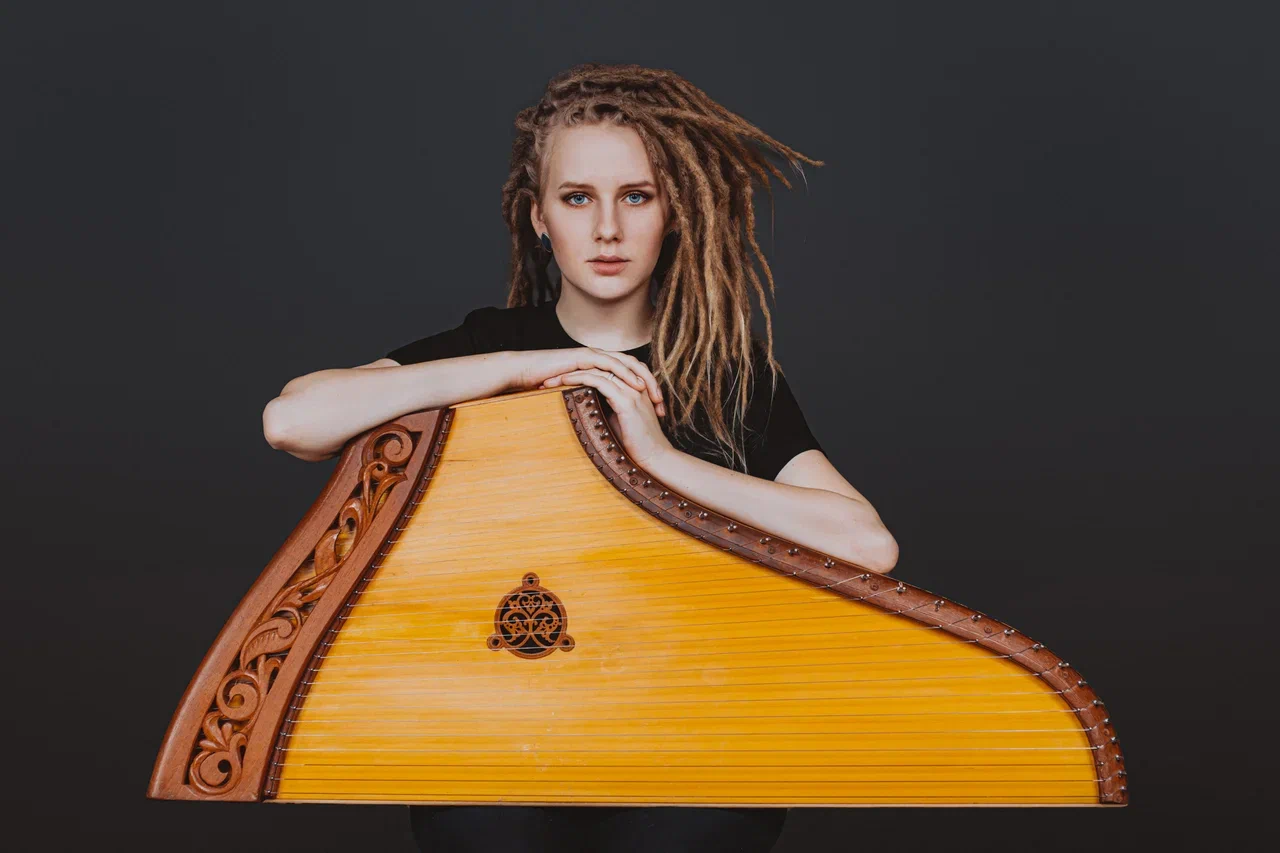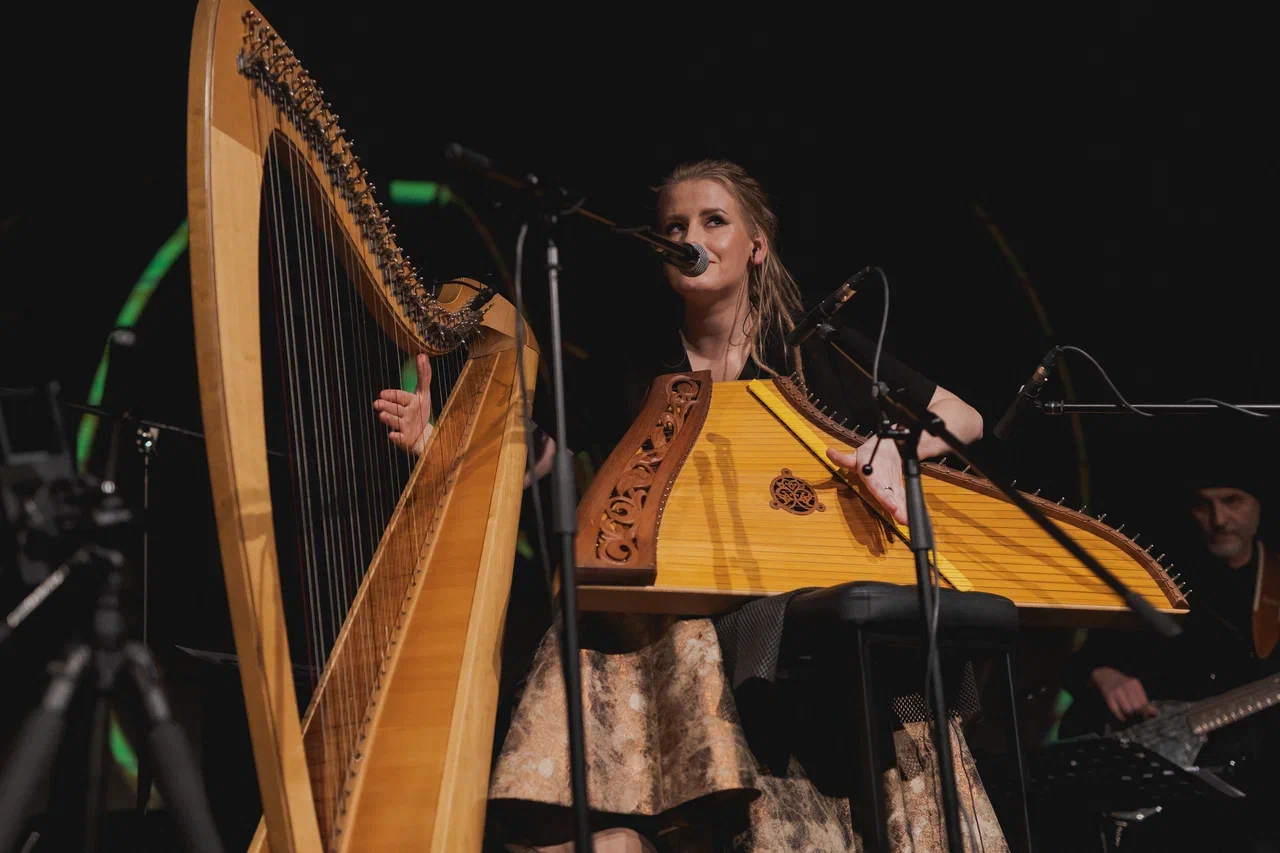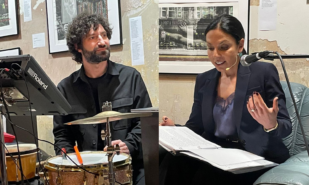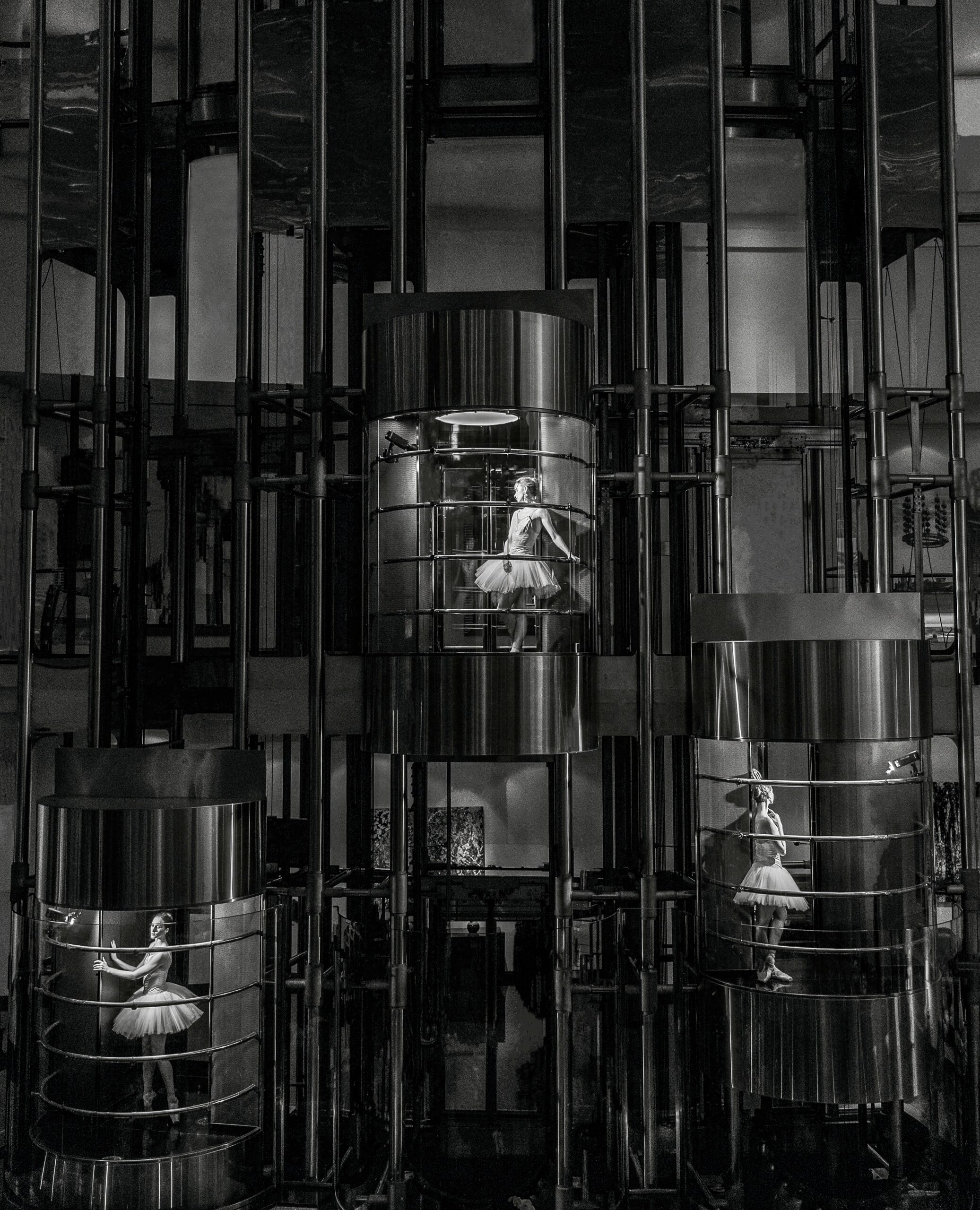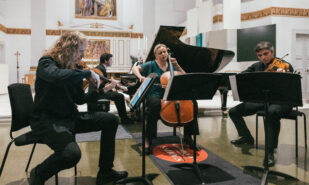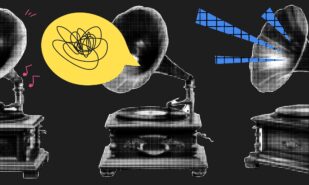“Gusli field” by Olga Glazova, perhaps somewhere in a parallel reality
In London, a charity festival-marathon Music Saves the World was held at the World Heart Beat Academy in Embassy Gardens and organised by Maria Semushkina. Outstanding musicians from all over the world performed in support of talented refugee children, as well as music schools affected by wars and conflicts.
After the concert, the London Cult spoke with Olga Glazova, guslar performer, singer and composer, winner of more than 30 international and Russian competitions, about inspiration, career, and why the most important thing for a musician is to never give up.
— Olga, why gusli? How did you choose this instrumentfor your career?
— At the age of six, I heard the gusli in the second grade of high school and decided that I would play this instrument. That’s all! I graduated from a music school (for gusli), a college of arts (for gusli) and the St. Petersburg Conservatory (for gusli).
You can’t enter a higher educational institution without your own instrument, and gusli is usually best made by private craftsmen, so I had to order the instrument myself. It was at that moment that I realized: if I want to perform and sing with gusli, I need an expanded version of it, more strings. Ordinary academic gusli repeats part of the vocal range, and it is not interesting to accompany yourself. Thus, in the fall of 2012, the world’s first 30-string harp for professional use appeared.
Today, the model has become so recognisable that other workshops copy it. Of course, without the knowledge of the craftsman or mine. It’s easy to copy the appearance, just take measurements from photographs, but no one has been able to achieve the same sound or come closer to my timbre.
— You perform both in Russia and abroad. Is there a difference in the audience’s perception of the instrument, or in the listeners’ reaction?
— Yes, unfortunately, there is a specific difference, I feel it at every concert. When I go on stage in a Russian hall, I sensethat they don’t accept me. Difference from performers who play familiar instruments is perceived as strangeness: “Prove that we need this!” Moreover, I know: just start playing, and people will be happy, their attitude will change to a favourableone, this always happens. But! In any case, this is a struggle.
But in Europe (France, Germany, Finland, Estonia, Latvia, England, etc.), for some reason unknown to me, listeners-spectators, when they see the instrument for the first time, are already kind in advance, ready to find out what I will “give” them.
— So, in Europe people are more receptive to new things, more open?
— I can’t say that yet. My experience is quite narrowly focused: after all, I haven’t performed in all European halls. I operate only with facts from my life, but I don’t know whether the same applies to everyone. In my experience, it’s easier here. There is no emotional closeness, hostility… I would like to choose something easier instead of the word “hostility”… It would be better to say: distrust!
— How has your career and musical life changed with traveling around the world?
— In just over a decade, I, as my own producer and manager, have understood the Russian music industry a little more. But it didn’t help me… Just kidding! My answer to your question would be: no, nothing has changed for me, and nothing has gotten worse. This is quite unusual. Even in 2020, the year of the pandemic, there were quite a lot of performances and trips. Only two months were lost when the borders were closed. For example, I was unable to give a lecture at the Sibelius Academy in Helsinki.
— What inspires you?
— People. The city and its location on the planet, the weather, the ability to walk one familiar route or buy food only in certain supermarkets are not very important to me. I mean, here’s an example: someone says something like “oh, I won’t go to the concert, it’s a long drive from my area.” Really?! Even Vladivostok is not far from St. Petersburg, board a plane and sleep/watch a movie, it’s only 8 hours, take care of yourself. And here we are talking about only 40 minutes in the subway. How can you make your life better if you think like this? Perhaps someone will think that I am detached from reality, that I am in some kind of “gusli field”? Let be!
As for inspiration… When you begin to understand the profession called self-made artist, learning from the examples of other, well-known and unknown groups, you see: first of all, it’s working with people. From what I have seen, what I don’t like most is the licentiousness and inappropriate behaviour of artists, a certain established stereotype: creative people should be accepted with their oddities. No genius should allow themselves to lack empathy and immaturity!
— What should the audience take away from your concert, from your “gusli field”?
— It seems to me that the most correct question is, what does a particular person need to get from a concert? But I want to talk about something else…
The concept of “music” today refers to environmental noise, and not music. Everywhere – taxis, cafes, shops, streets, restaurants, receptions, smartphones, etc. Try to get to the concert in silence, so that the ear can rest and prepare. It’s almost impossible! In London there is no such bright environmental noise around, but people speak much louder every day than in Russia.
Let’s return to the gusli concert… It is impossible to say for sure whether the goal I pursue and the musical interaction correspond to the people who listen to my performances. Of course, every time you limit yourself in the number of tasks you want to perform at a particular concert, you think about what to share, what to say. Listeners won’t wonder why I don’t use, say, the third finger, but more often play with the fourth, or why I started playing with the fifth finger at a particular moment. They look, listen to the sound mass and… perceive “theirs.” At the same time, “me plus them” will not fit together, no way!
— Will you still have concerts in London?
— Yes, yes and yes again. I realised that here, in a musical sense, everything is very interesting for me. The turning point came when I brought my mother here in the spring of 2023 to fulfil her dream of “seeing London.” And at this moment, very fortunately, Boris Grebenshchikov writes to me: “We need to record gusli.” I answer: “Oh! I’m coming in two weeks, I can take it with me?” – “Sure!” It turned out that my mother and I left the hotel together, she went to museums, and I went to meetings, rehearsals, recordings, and concerts.
— Collaboration, environment… How important is this for a musician? Or can a genius make himself?
— In general, one of the main things in a musician’s life is support and understanding. Because if you don’t have the resources and opportunities to immediately show yourself, if you weren’t born inside a concert agency, then you need to go through a certain path to establish yourself as an artist and find “your” connections. At the beginning of the journey, you receive nothing: no support, no understanding. And that’s true! But if you take this as a complete confirmation or complete refutation of your talent, then you won’t be able to move. Therefore, the right thing to do is not to give up in any case!
I received a lot of kindness, attention, experience, and all my life I will be grateful to many famous people and non-public people. I won’t name the unknown ones, because they didn’t choose public praise. But I’ll be happy to list a few famous names: Artemy Lebedev, Anton Belyaev (THERR MAITZ), Boris Grebenshchikov, Natalya O’Shey (Helavisa, Melnitsa), Andrey Bledny (25/17), THEODOR BASTARD, Affinage, Sergey Fedorovich Letov, Maris Lasmanis, Gregg Kofi Brown (OSIBISA), Lyubov Tolkalina, Sergey Starostin, Brushsha Monakova, Katya Antonova, Zhenya Gluck…
What else does it mean to not give up? You don’t need to turn the planet over, spin it in the opposite direction, and so on. You just need to reach people who are confident in your talent, hard work, and perseverance. And at some point,quantity will turn into quality.
You also have to accept that brilliant music will not sell itself. Never! Since recognition of the author’s genius is largely a matter of chance. People can be accustomed to anything, and they will accept any event. I’m not talking about the current situation in the world, but in principle about the history of mankind. People lived without electricity, it appeared, and everyone got used to it. Humanity existed without smartphones, then they entered our lives, and we can no longer imagine how we can live without them. Gadgets will go away, people will get used to something else…
And in the same way, somewhere in a parallel reality, we have a completely different layer – musical, global, private. You yourself know that if there is some active person who is promoting something, they will do it. There are people who simply know how to “move.” So, it would be better for a musician to know what resources you have, kinds ofopportunities to continue your activity, and not necessarily musical at the beginning. And then think about what other steps you can take to achieve your goal. And so, step by step, reach your best people!
P.S. At the end of April, Olga Glazova will come to London again, this time for a month. And she noted that she would be glad to cooperate.

